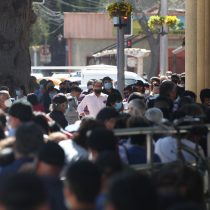
Within the framework of the new constitutional process that began a few weeks ago with the work of the Committee of Experts, the Technical Committee on Administration, and the installation of the Executive Secretariat for Citizen Participation, it seems essential to us to rescue some data from the previous process in terms of electoral participation of the foreign population, in order to observe the current opportunities and challenges.
The good news reflected in these data is that the electoral participation of the migrant population increased from 20.9% in 2020 to 61.3% in the constitutional plebiscite of September 2022 (Servel, 2023). This is explained, in part, by the obligatory nature of voting, which began to govern this process, but also by phenomena that occur as the time in the country of destination is longer, and thus increases the sense and feeling of belonging that is produced by inhabiting a country in which they work, educate their children, are part of the health system, use public transportation, pay their taxes, and participate in the Neighborhood Councils.
When analyzing by nationality, Venezuelans are the ones with the highest percentage of voting (78.5%), that is, of 34,605 people of this nationality and who have the right to vote, 27,150 do. In the same way, Bolivians (70%) and Peruvians (69.6%) vote. The population that votes the least, being able to do so, are of Argentine nationality (49.4%).
A second piece of good news concerns the issue of gender. In several nationalities those who had a greater participation were women: Bolivians (60%), Colombians (58.1%) and Peruvians (55.3%) are the ones who stand out most with their presence at the polls. Where there is a strong male presence is in people of Haitian nationality (71.5%).
The civil and political rights of migrant people and communities that inhabit our country continue to be a central issue when talking about social cohesion and coexistence. The results presented here are positive news that invites us to reflect on this new process that opens: we require a constitutional proposal that recognizes the fundamental rights of migrant people and communities and makes them feel part of it, so that these numbers continue to increase and we can continue to cement a new social pact for the Chile of the XXI century.
Follow us on
The content expressed in this opinion column is the sole responsibility of its author, and does not necessarily reflect the editorial line or position of El Mostrador.
"El reclamo puede ser genuino, pero construido sobre una mentira", apuntó el presidente Javier Milei…
El gobernador de la provincia de Buenos Aires, Axel Kicillof, encabezó un acto en Ensenada…
El diputado nacional de La Libertad Avanza, José Luis Espert, expresó su confianza en la…
Tras la masiva reaparición de Cristina Fernández de Kirchner, el presidente Javier Milei apuntó contra…
El principal propósito de la nueva comisión es evaluar los recursos humanos en el Senado,…
En una medida que busca redefinir las condiciones de los seguros de automóviles en Argentina,…
Esta web usa cookies.